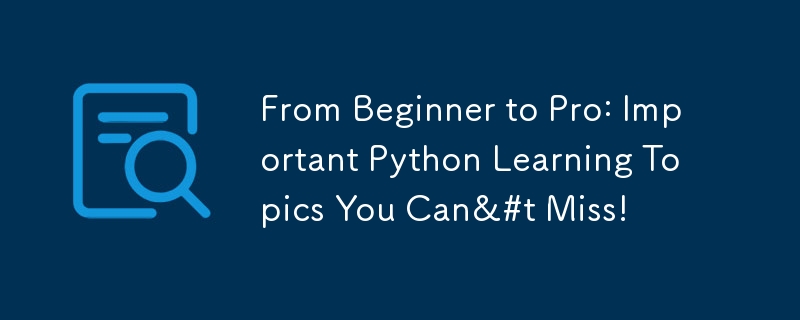Home >Backend Development >Python Tutorial >From Beginner to Pro: Important Python Learning Topics You Can&#t Miss!
From Beginner to Pro: Important Python Learning Topics You Can&#t Miss!
- Susan SarandonOriginal
- 2024-10-23 12:35:02774browse

Hey guys! If you’re starting to learn Python, great choice! I found some cool stats about it, and while looking for a good syllabus, I noticed some topics come up a lot. So, I made a beginner friendly Python syllabus that covers all the key concepts. I hope you like it!
1. Introduction to Python
- What is Python?
- Installing Python
- Running Python scripts
- Python IDEs (Integrated Development Environments)
- Basic Syntax: Comments, Indentation, and Variables
- Python Data Types: Strings, Integers, Floats, Booleans
- Basic Input and Output
- Python's Interactive Mode and REPL
- Using Jupyter Notebooks
- Understanding the Python Shell
- Basic Troubleshooting: Common Errors and Fixes
2. Control Flow
- Conditional Statements: if, else, elif
- Comparison and Logical Operators
- Loops:
- for loops
- while loops
- Loop control statements: break, continue, pass
- List and Dictionary Comprehensions
- Nested Loops
- Using enumerate() with Loops
- The zip() Function for Iteration
- Error Handling in Loops
3. Functions
- Defining Functions with def
- Parameters and Arguments
- Return Values
- Variable Scope: Local vs Global
- Lambda Functions
- Recursion
- Default and Keyword Arguments
- Variable-length Arguments (*args and `kwargs`)**
- Higher-order Functions
- Decorators (basic introduction)
4. Data Structures
- Lists:
- Indexing, Slicing, and Methods (append, insert, remove, etc.)
- Tuples:
- Immutability and Use Cases
- Dictionaries:
- Key-Value Pairs, Methods (get, keys, values, etc.)
- Sets:
- Set Operations (union, intersection, difference)
- Nested Data Structures
- List vs. Tuple vs. Set vs. Dictionary
- Understanding collections module: Counter, defaultdict, OrderedDict
- Data Structure Performance Considerations
5. Object-Oriented Programming (OOP)
- Classes and Objects
- Attributes and Methods
- The self Keyword
- Constructors (__init__)
- Inheritance
- Single and Multiple Inheritance
- Polymorphism
- Encapsulation and Abstraction
- Special Methods: str, repr, len, etc.
- Class vs. Instance Variables
- Class Methods and Static Methods
- Composition vs. Inheritance
- Abstract Base Classes (ABCs)
6. Error Handling
- Types of Errors: Syntax, Logic, Runtime
- try, except, finally blocks
- Raising Exceptions with raise
- Custom Exception Classes
- Using assert for Debugging
- Logging Errors with the logging Module
- Creating Context Managers for Error Handling
- Best Practices in Error Handling
7. File Handling
- Opening Files: open(), read(), write()
- Reading and Writing to Files
- File Modes (r, w, a, b)
- Working with File Paths
- Using with to Automatically Close Files
- Reading and Writing CSV Files
- Working with JSON Files
- File Iterators
- Handling Large Files with Buffered Reading/Writing
8. Modules and Packages
- Importing Modules: import, from ... import
- Python Standard Library (e.g., math, random, datetime)
- Creating and Using Custom Modules
- Using Third-Party Packages with pip
- Virtual Environments
- Understanding the __init__.py file
- Building Your Own Package
- Using requirements.txt for Dependency Management
- Exploring the sys and os Modules
9. Working with Libraries
- NumPy (for array manipulation)
- Pandas (for data analysis and manipulation)
- Matplotlib and Seaborn (for data visualization)
- Requests (for handling HTTP requests)
- JSON Handling
- Using SciPy for Scientific Computing
- Working with SQLAlchemy for Database Interaction
- Web Scraping with Beautiful Soup and Scrapy
- Introduction to TensorFlow and Keras for Machine Learning
10. Advanced Topics
- List and Dictionary Comprehensions (advanced usage)
- Generators and yield keyword
- Decorators and @decorator_name
- Context Managers
- Regular Expressions (Regex)
- Unit Testing with unittest
- Metaclasses and their Use Cases
- Asynchronous Programming (async/await)
- Threading and Multiprocessing
- Python’s functools module (e.g., lru_cache, partial)
- Descriptors and Property Decorators
- Type Hinting and Annotations
- Advanced Error Handling and Custom Exceptions
11. Working with APIs
- What are APIs?
- Consuming APIs with Python
- Authentication (Basic, OAuth)
- Parsing JSON from APIs
- Using the requests Library for API Calls
- Working with REST vs. SOAP APIs
- Handling API Rate Limiting
- Creating Your Own API with Flask or FastAPI
12. Introduction to Data Science
- Basics of Data Manipulation with Pandas
- Data Visualization with Matplotlib/Seaborn
- Basic Statistics in Python
- Introduction to Machine Learning with Scikit-learn (optional)
- Exploratory Data Analysis (EDA)
- Feature Engineering and Selection
- Data Cleaning Techniques
- Understanding Overfitting and Underfitting
13. Final Project
- Develop a Python project that integrates different concepts:
- Data Analysis, Web Scraping, or a Simple Game
- Project Planning and Documentation
- Version Control with Git
- Deployment Options (e.g., Heroku, GitHub Pages)
- Presenting Your Project: Best Practices
Resources to Learn Python:
- Learn Python Free
- Kaggel Course on Python
- CodeAcacdmy Adv Python Course
- Official Python DOC
If you have any suggestions or if I missed something, just drop a comment! Happy coding!
The above is the detailed content of From Beginner to Pro: Important Python Learning Topics You Can&#t Miss!. For more information, please follow other related articles on the PHP Chinese website!
Python flask json fastapi scrapy numpy scipy pandas matplotlib pip Static Array Object if for while try Error Logging math break continue union Lambda raise using class Length Regex finally Conditional Property len append function default input github git jupyter database tensorflow keras http
Statement:
The content of this article is voluntarily contributed by netizens, and the copyright belongs to the original author. This site does not assume corresponding legal responsibility. If you find any content suspected of plagiarism or infringement, please contact admin@php.cn
Previous article:How to Capture and Print Raw HTTP Requests Using Python?Next article:How to Capture and Print Raw HTTP Requests Using Python?

